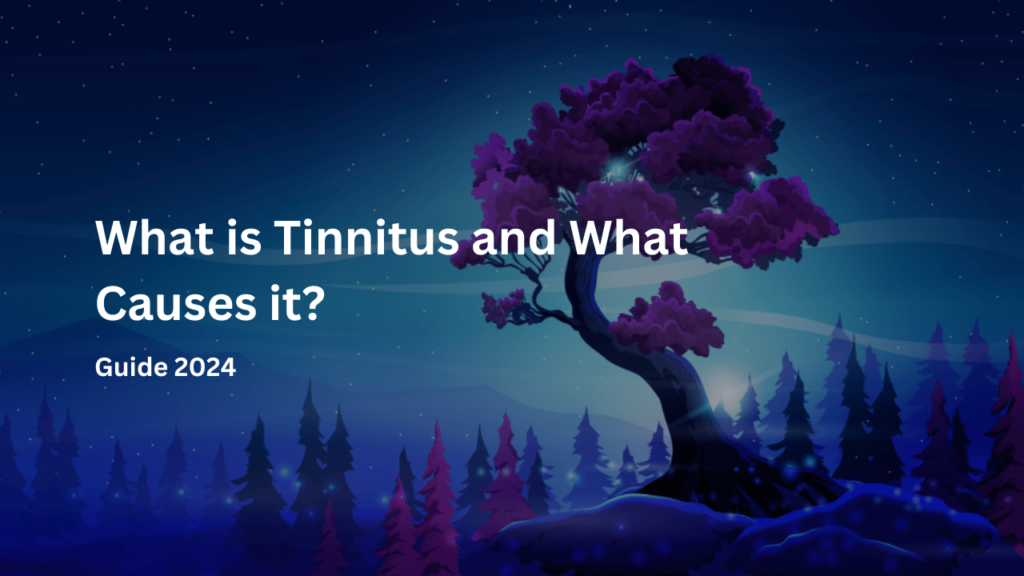Tinnitus is the perception of noise or ringing in the ears when no external sound is present.
It can manifest as ringing, buzzing, hissing, whistling, or even roaring sounds. The condition can affect one or both ears and can vary in pitch and intensity.
While it’s often associated with older adults, tinnitus can affect individuals of any age, including children.

What are the Main Causes of Tinnitus?
Understanding the causes of tinnitus is crucial for effective management. Tinnitus is not a disease itself but a symptom of an underlying condition.
Some common causes include:
- Exposure to Loud Noise: Frequent exposure to loud sounds can damage the tiny hair cells in the inner ear, leading to tinnitus. This is common among individuals working in noisy environments and those who listen to loud music.
- Age-Related Hearing Loss: As people age, hearing loss can occur, which may cause tinnitus. This type of hearing loss is known as presbycusis.
- Ear and Sinus Infections: Infections can lead to an accumulation of fluid and increased pressure in the ear, causing tinnitus symptoms.
- Diseases of the Heart or Blood Vessels: Conditions that affect blood flow, such as atherosclerosis, can increase the likelihood of tinnitus.
- Medications: Some prescription and over-the-counter medications can cause or worsen tinnitus. Aspirin, certain antibiotics, and some antidepressants are known culprits.
- Earwax Blockage: Excessive earwax can block the ear canal, leading to hearing loss or irritation of the eardrum, which can result in tinnitus.
Symptoms of Tinnitus
The primary symptom of tinnitus is the hearing of sound when no external sound is present. The nature of these sounds can vary significantly among individuals and may include:
- Ringing
- Buzzing
- Roaring
- Clicking
- Hissing
- Humming
The volume of the noise can fluctuate and might be more noticeable at night or during periods of quiet. For some, tinnitus can lead to difficulty concentrating, sleeping problems, and significant distress.
Management Strategies For Tinnitus
You can try to cure tinnitus at home with natural remedies or try to manage the condition with the strategies mentioned below:
Sound Therapy
Sound therapy uses external noises to help mask the sound of tinnitus. Green noise machines, apps, and hearing aids can provide relief by covering up the unwanted sounds.
You can use Several Noise such as:
Counselling
Counselling programs, such as cognitive behavioural therapy (CBT), can help individuals learn coping mechanisms to make tinnitus less bothersome.
Hearing Aids
For those with hearing loss, hearing aids can amplify external sounds, making tinnitus less noticeable.
Medication
Although no medication directly treats tinnitus, some can help alleviate the stress, anxiety, and depression that often accompany the condition.
Lifestyle Adjustments
Protecting ears from loud noises, managing stress through relaxation techniques, and maintaining a healthy lifestyle can help reduce the severity of tinnitus symptoms.
Frequently Asked Questions
Q1: Can you fix tinnitus?
Ans: There is no cure yet, but treatments can help manage symptoms in the majority of cases through sound therapy, stress reduction, drug therapy, and other methods.
Q2: Can you live a long life with tinnitus?
Ans: Yes, tinnitus on its own is rarely disabling or life-threatening. Staying healthy overall with good lifestyle habits can allow one to live a long, productive life.
Q3: What not to do if you have tinnitus?
Ans: Avoid loud noises and irritants like smoking which can make tinnitus worse. Don’t focus constantly on the sounds. Stay active and don’t isolate yourself.
Q4: What is the simple trick to stop tinnitus?
Ans: There is no simple trick, but relaxation techniques like deep breathing and cognitive behavioural therapy can help train your brain to tune out and cope with the sounds.
Q5: Can drinking more water help tinnitus?
Ans: Staying hydrated is helpful, but simply drinking more water does not directly improve or cure tinnitus in any significant way for most people.
The Bottom Line
Tinnitus is a complex condition with a wide range of causes and symptoms. Understanding the underlying cause is essential for effective management. While there’s no cure for tinnitus, sound therapy, counselling, hearing aids, medication, and lifestyle adjustments can provide significant relief.
If you suspect you have tinnitus, it’s crucial to consult with a healthcare professional who can guide you through the diagnosis and management process, ensuring that the advice and treatment you receive are grounded in expertise and trustworthiness.
Remember, managing tinnitus effectively requires a comprehensive approach tailored to the individual’s specific needs and underlying conditions. With the right support and management strategies, individuals with tinnitus can lead fulfilling lives without being overwhelmed by their symptoms.



